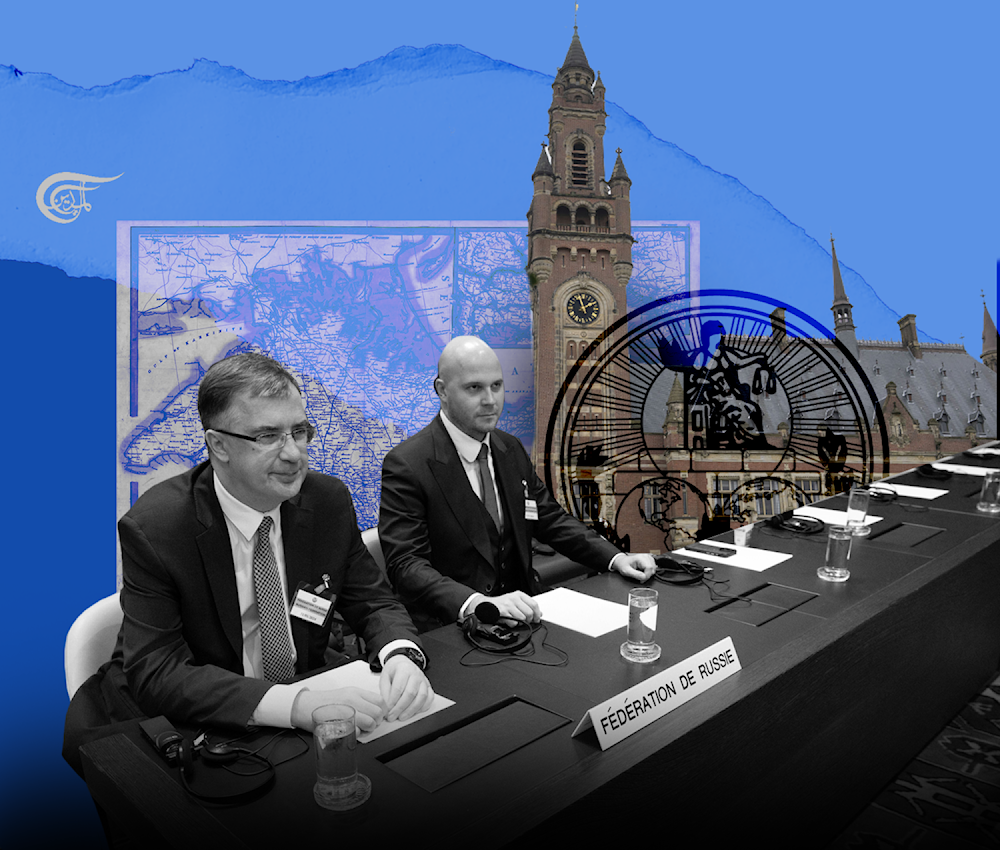Ukraine Crushingly Defeated at ICJ
The ICJ's 13 judges ruled in Moscow’s favor in all but two instances. As we shall see, even these findings were highly questionable.
-

The ICJ ruling was highly significant, and threw up a great many seismic findings, raising multiple grave questions (Illustrated by Hadi Dbouk to Al Mayadeen English)
On January 31st, the International Court of Justice (ICJ) issued a damning ruling in a case brought by Ukraine, in 2017. It accused Moscow of almost every conceivable “terrorism” offence codified in international law, particularly supporting, sponsoring, and committing “terrorism” in Donbas, while racially discriminating against ethnic Ukrainians and Tatars in Crimea, since 2014. In the end, the Court’s 13 judges ruled in Moscow’s favour in all but two instances. As we shall see, even these findings were highly questionable.
The ruling was highly significant, and threw up a great many seismic findings, raising multiple grave questions. First, about the Ukrainian government’s narrative about events in Crimea and Donbas over the past decade, duly parroted and reinforced by Western journalists, foreign policy pundits, military, intelligence and security officials, and politicians every step of the way. Second, about what precisely Kiev was itself doing during its “anti-terrorist operation”, launched in April 2014 against “pro-Russian separatists”.
While Kiev’s most ardent Western advocates are now admitting the war is already lost, and mainstream news outlets almost daily publish dire reports pointing unambiguously to a total frontline collapse in the very near future, the ICJ’s groundbreaking findings were universally ignored by the media. But of course - a Western government and media apparatus actively complicit in the horrors inflicted in Donbas by Ukraine and its British- and US-trained and armed fascist paramilitaries can only be expected to remain eerily silent.
‘Proving Facts’
Several charges levelled by Ukraine in 2017 related to purported treatment of Crimea’s Tatar and Ukrainian population, following the peninsula’s reunification with Moscow in March 2014. Kiev argued that Russian authorities had thereafter engaged in a concerted, state-sanctioned campaign of measures “that discriminate against persons of Crimean Tatar origin based on their ethnic origin.” The ICJ brutally slapped down almost everyone, while severely indicting the quality of evidence supplied in their support.
For example, the Court was “not convinced” the Russian Federation had discriminated against any Tatar or Ukrainian on the explicit basis of their ethnicity, or that Ukraine-supplied evidence indicated “a pattern of racial discrimination” against anyone. Judges furthermore dismissed witness testimony attesting to these accusations “collected many years after the relevant events” Kiev provided, which was “not supported by corroborating documentation.” They ruled any and all such “evidence” must be “treated with caution”, and associated charges “had not been established” as a result”:
“The reports relied on by Ukraine are of limited value in confirming that the relevant measures are of a racially discriminatory character…Ukraine has not demonstrated…reasonable grounds to suspect that racial discrimination had taken place, which should have prompted the Russian authorities to investigate.”
A particularly striking excerpt of the judgement noted the ICJ “held that certain materials, such as press articles and extracts from publications, are regarded ‘not as evidence capable of proving facts’,” speaking volumes about just how seriously the world’s premier international justice court views Western media reporting on serious matters. Which is to say, not at all. Kiev cited a wealth of negative press coverage to support its arguments, and reports from government-funded NGOs, on the purported plight of Tatars post-reunification.
Ukraine also claimed post-reunification, Crimean authorities created “difficulty” for local residents by forcing them to choose between Ukrainian and Russian citizenship. Again, this was robustly rejected by the Court, which also noted, “the Russian Federation…produced evidence substantiating its attempts at preserving Ukrainian cultural heritage.” Meanwhile, other Moscow-supplied documentation showed “ethnic Ukrainian and Crimean Tatar organizations” were “successful in applying to hold events,” but “multiple events organized by ethnic Russians” were denied. In other words, officials were clearly unconcerned by the population’s ethnic origin.
Elsewhere, Kiev had invoked a 90% reduction in demand across Crimea “for school instruction in the Ukrainian language” as a sign authorities had deliberately suppressed teaching in Ukrainian. Yet again, the ICJ was unmoved, attributing this to not only “a dominant Russian cultural environment and the departure of thousands of pro-Ukrainian Crimean residents to mainland Ukraine,” but to a genuine desire by locals to be taught in Russian, not Ukrainian.
Nonetheless, the ICJ did find Moscow “violated its obligations of the International Convention on the Elimination of Racial Discrimination,” as Russia did not adequately demonstrate “it complied with its duty to protect the rights of ethnic Ukrainians from a disparate adverse effect based on their ethnic origin.” This, despite the Court conceding it was “unable to conclude, on the basis of the evidence presented, that parents have been subjected to harassment or manipulative conduct aimed at deterring them from articulating their preference.”
‘Alleged Offenders’
On the other charges, the ICJ was particularly excoriating. Ukraine accused Moscow of presiding over a campaign of “terrorism” in Donbas, which included the July 2014 downing of MH17. Kiev moreover framed the breakaway Donetsk and Lugansk “people’s republics” as terrorist factions, on a par with Al Qaeda. Judges overwhelmingly rejected these characterizations:
“The Court reaffirmed that an organization cannot be considered to be ‘terrorist’ just because one state labels it this way… [Neither the Donetsk and Lugansk “people’s republics” had] previously been characterized as being terrorist in nature by an organ of the United Nations.”
The ICJ furthermore found that, contrary to Western and Ukrainian allegations, Russia could not be found liable for facilitating terror activity against Kiev. Documentation supplied to that effect was considered “vague and highly generalized,” lacking anything like substantive evidence, let alone proof. Moscow was nonetheless found to have fallen short of its “obligation…to investigate allegations of the commission of terrorism financing offences by alleged offenders present in its territory.”
Even this flaccid finding was spurred by Russia simply not providing evidence it had upheld this “obligation” to the ICJ, and government of Ukraine. Moscow conversely did launch investigations into some “alleged offenders” named by Kiev, and handed over their results, which determined the individuals in question either “[did] not exist in the Russian Federation or their location could not be identified.”
In sum, Kiev was not fighting a counterinsurgency campaign against Russia-supported “terrorists”, and there is no serious indication Moscow was responsible for the litany of violent acts - including all-out invasion of Ukraine - attributed to the Kremlin following the US-orchestrated Maidan coup 10 years ago. Little consolation to the scores of independent researchers, journalists and activists who spent the past decade attempting to challenge prevailing Western narratives. Although evidently, the truth does eventually out, even if it’s ignored by the mainstream.

 Kit Klarenberg
Kit Klarenberg
 6 Min Read
6 Min Read











